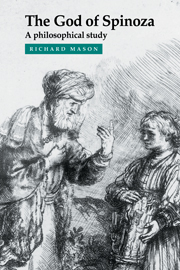1 - How God exists
Published online by Cambridge University Press: 06 January 2010
Summary
Does God exist, and if so, how?
Part I of the Ethics does offer answers to those questions, but that is not to say that Spinoza asked them in those ways, and still less to say why he might have asked them.
This may seem a disconcerting start – a faltering before we even begin – but the point to be grasped straightaway is an essential one. Part I of the Ethics contains demonstrations of God's existence. The first fifteen propositions constitute a characterisation of God's nature. We can translate this material out of the scholastic language and the geometrical form in which Spinoza composed it; but then we may still be no wiser about its aims and intention.
This chapter will aim to specify the place of Spinoza's God – what God is for. But to start with the missing context is not just a piece of routine, academic prefatory caution. Why God is needed – in the sense that God's existence is supposed to be proved by Spinoza – as we shall see, is not obvious. Spinoza never tells us why he is doing what he is.
WHY GOD WAS NOT NEEDED
It can help to exclude two possibilities immediately. First, the existence of God was not intended as a rebuttal to anyone – maybe an atheist or a sceptic – who might want to deny it. The demonstrations of God's existence were not meant to be proofs that might be used to persuade or convince an atheist or agnostic.
- Type
- Chapter
- Information
- The God of SpinozaA Philosophical Study, pp. 21 - 50Publisher: Cambridge University PressPrint publication year: 1997



